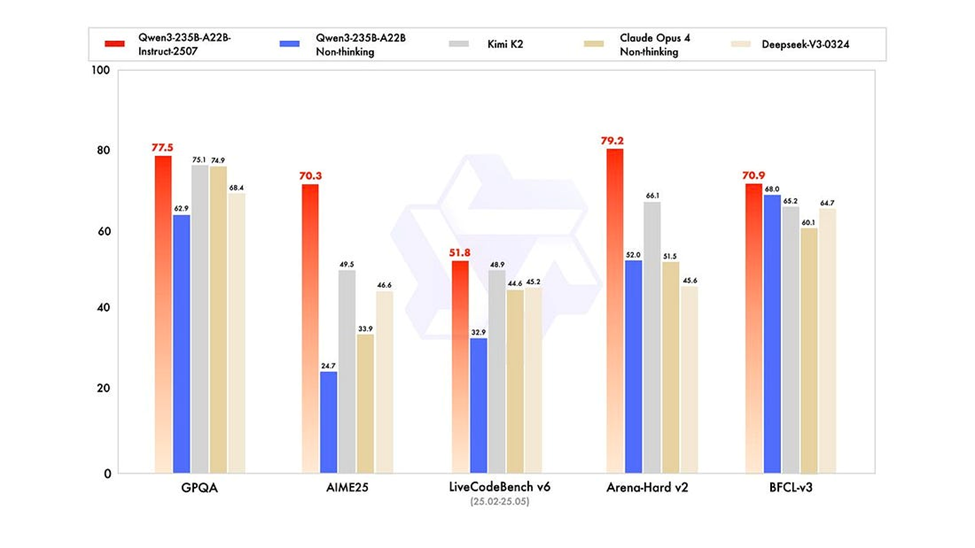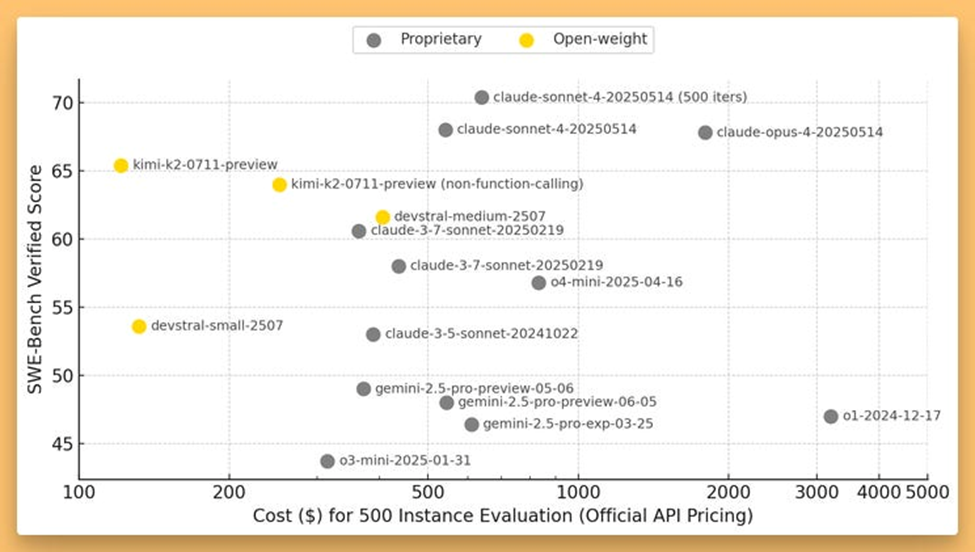
There is a new arms race brewing. A cold war not fought with atomic weapons, but something potentially more powerful: AI. While the U.S. is leading the pack for closed models such as ChatGPT, Claude, and Gemini, in the world of open source models, China is the clear leader with models like Kimi K2 and Qwen 3. Can the U.S. fight back?
On a more positive note, my mind was blown not once, but twice last week! OpenAI’s ChatGPT agent and Replit’s AI coding platform are two incredible examples of how Agentic AI can revolutionize the way people work and live.
If that’s not enough to convince you that real change is coming, how about this: Both OpenAI and Google have AI models that were able to win Gold at the International Math Olympiad, one of the most challenging math competitions in the world.
Let’s dig in!
Open source
What happened
There were two major releases of open source AI models recently. Moonshot released Kimi K2 (try it here) and Alibaba Cloud released a major update to Qwen 3 (specifically Qwen3-235B-Thinking-2507 – try it here). Both of these models are state of the art for open source models and can even compete with the best closed source models on many benchmarks. Here’s a chart of Kimi K2’s performance vs other leading LLMs:

And here’s a chart of Qwen 3’s performance vs other leading LLMs:

What’s incredible here is not just the power of these models, but the cost. Look at how Kimi K2 compares with other models on a price/token graph (top left of the chart means that the model is smart and cheap):

It is important to note that both Moonshot and Alibaba are Chinese companies. While the U.S. does have a few open source LLMs, most notably Llama from Meta, Gemma from Google, and Nemotron from Nvidia, none of them are near the top of the leaderboards. Why is that?
Why it matters
Open source LLMs are critical for several reasons:
- Transparency – Researchers and developers can inspect how models work, enabling trust and accountability.
- Customization – Organizations can fine-tune or adapt models to specific use cases or constraints.
- Innovation – Open access accelerates research and experimentation across industries.
- Security & privacy – Self-hosted models reduce reliance on external APIs, protecting sensitive data.
- Cost control – Avoids usage fees from proprietary APIs; better long-term economics for large-scale deployments.
- Benchmarking – Enables standardized comparisons and reproducibility in academic and commercial contexts.
- Global access – Lowers entry barriers for startups, students, and developers worldwide.
- Prevents monopolies – Reduces dominance by a few major tech companies, promoting competition and fairness.
Right now, the U.S. is falling behind China and that means that we will be challenged to remain competitive in this space. While China has amazing technical resources and incredible researchers, they are also constrained by the nature of the Chinese government and may be subject to monitoring and oversight that could be problematic for U.S. companies.
The White House has just released “Winning the Race – America’s AI Action Plan”. This 25-page strategy frames AI as a national priority on par with the space race or the Cold War, aiming to secure U.S. dominance with 90 policy proposals including a directive to “Encourage Open-Source and Open-Weight AI.” While it’s very exciting to see our government focused on AI, there are also more grass roots efforts that we should be paying attention to such as Nathan Lambert’s “American DeepSeek Project.”
As a quick reminder, DeepSeek is another Chinese LLM that crushed benchmarks and made headlines for being trained incredibly inexpensively. An “American DeepSeek Project” is therefore a call to arms to have U.S. researchers build “a fully open-source model at the scale and performance of current (publicly available) frontier models, within two years.”
These issues affect all of us, including not only software vendors like Yardi, but also consumers of the software who rely on LLMs to power the tools of the future. Without open source models, Yardi will be forever locked in to working with only a handful of vendors. We will not have the ability to create fine-tuned versions of models that have enhanced domain-specific skills. If we rely on Chinese models, we will be challenged to ensure they are behaving in a way that is consistent with our security and privacy practices.
OpenAI Agent & Replit
What happened
OpenAI released their ChatGPT agent (watch the announcement video here), an incredibly powerful tool that can now use a virtual computer to handle complex tasks from start to finish. As OpenAI puts it: “You can now ask ChatGPT to handle requests like “look at my calendar and brief me on upcoming client meetings based on recent news,” “plan and buy ingredients to make Japanese breakfast for four,” and “analyze three competitors and create a slide deck.” ChatGPT will intelligently navigate websites, filter results, prompt you to log in securely when needed, run code, conduct analysis, and even deliver editable slideshows and spreadsheets that summarize its findings.”
Also, Replit has released an absolutely mind-blowing AI agent that builds entire applications for you including setting up all the infrastructure and handling the deployment of the app. While it wasn’t released last week, it crossed my desk recently and I tried it out and wanted to share it with you all. I have written about AI software coding agents such as Claude Code and OpenAI Codex before, but those tools are focused on existing software engineers who want to integrate AI agents into their existing development workflow. Replit is different. You don’t need to have an existing development workflow! You don’t need to know anything about software development, per se. All you need is an idea and the ability to communicate your requirements clearly.
Why it matters
These two agents are examples of how this advanced technology is being brought to the masses. I work at a software company where developers are building “agentic AI” into products using sophisticated tools like Flowise, MCP servers, and LangChain to solve complex business challenges. But now the average person can open their phone and, without deep technical knowledge, get an agentic AI to execute complex tasks, up to and including writing software!
These tools are truly incredible, and I urge you all to try them.
Gold at the International Math Olympiad
What happened
Both OpenAI and Google have developed AI models that were able to win Gold at the International Math Olympiad. “What is that?” you ask. The IMO (that’s what the cool kids call it) is the World Championship Mathematics Competition for High School students and it consists of six of the hardest math problems I’m sure you’ve ever seen (unless you’re a professional mathematician). Here’s an example:
“Consider a 2025×2025 grid of unit squares. Matilda wishes to place on the grid some rectangular tiles, possibly of different sizes, such that each side of every tile lies on a grid line and every unit square is covered by at most one tile.
Determine the minimum number of tiles Matilda needs to place so that each row and each column of the grid has exactly one unit square that is not covered by any tile.”
What?!
In this case, winning gold means getting more than 35 points out of a total of 42 possible. There are six questions, and credit is given for partial answers, up to seven points per question.
Why it matters
To anyone who thinks that LLMs and other modern AI models are “never” going to do x, y, or z, I offer this up as evidence that you should never say never. The level of intelligence and reasoning ability that is required to answer these questions is at the frontier of human capability. Just a few short years ago, ChatGPT couldn’t accurately tell you how many ‘r’s are in “strawberry” and now look how far we’ve come.
The power of AI has gotten so strong that even if it never gets any better than it is today, we could easily spend the next decade building new applications and new capabilities with it that will fundamentally change the way civilization operates.
Thank you all for tuning in. Please subscribe to be notified whenever a new post comes out and we look forward to seeing you on the next one.
Stay curious, my friends!
– David
Author bio
David is the industry principal of AI at Yardi, where he works closely with the sales team to help clients understand how Yardi’s solutions align with their business needs. A real estate technology, AI and IT guru with deep sales expertise and entrepreneurial roots, David brings decades of experience bridging the gap between technical innovation and real-world application. David’s superpower is making complex technical concepts approachable, interesting and easy to understand — especially for non-technical audiences. When he’s not working, you can find him skiing, rock climbing or racing his Tesla.
Disclaimer
This article is for general information purposes only. The opinions, analysis and commentary expressed are not and cannot be relied on as legal advice, and do not necessarily reflect the views of Yardi Systems, Inc., or any of its affiliates.


